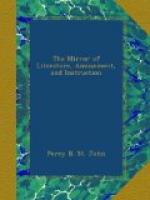They walked on mournfully, two and two, and Henri followed them with an interest that he could not account for, or define. The coffin advanced, preceded by the priests, bearing torches that were obscured by the silvery light of the moon; it was carried by six men, and among them it was easy to recognise Guillaume, by his profound sorrow; for, to Henri’s great surprise, he alone wept. The more aged men who followed the corpse, the one even next it, and who, of course, was the father, or nearest relative of the deceased, had, like the rest, merely a composed and serious countenance, undisfigured by any great affliction. The body was lowered into the grave; the officiating minister made a brief, and somewhat cold, discourse on the frailty of life; the young females afterwards came forward, and each threw her wreath of flowers on the coffin; and then chanted some rhymes.
The grave was then about to be filled up; the noise of the earth, in falling, resounded on the coffin, and Henri shuddered. The crowd gradually dispersed; Guillaume and Isabelle alone remained beside the tomb; Henri approached it, and Isabelle observing him, with a forced smile, said, “Did you know her? I have seen you follow the funeral train with apparent interest, and now I behold you in tears; are you a relation, friend, or only even a native of the same place?” Henri listened to these questions with great surprise; “I scarcely understand you,” he at length replied; “I am merely a traveller; but the deceased was, doubtless, your friend?”—“Yes, my best, my dearest friend; yet our friendship was doomed to be of very short continuance. I was not at all acquainted with her until, about three months ago, she came to reside with my father, who is a physician, and to whose care her relations, when aware of her forlorn state, confided her.” “Her relations,” remarked Henri, “did not seem to be much affected; they appeared, indeed, quite resigned to their loss.” “Her relations!” replied Isabelle, “she had none here; she was a stranger, and my father attended as chief mourner; he lamented her loss, but Marie was not his daughter, although I myself loved her as a sister.” “Marie!” she was called Marie! but what was her family-name? Often shall I think of her unhappy destiny. “Marie was only a name that she adopted, and we called her, because she could never bear to hear her own.” “Isabelle,” said she to me, almost at our first meeting, “never name me as he who has destroyed me named me; never, I entreat you, call me dear Louise.” “Louise!” exclaimed Henri, growing pale as death; “Louise!” “Yes, Louise Courtin, of Verny!” No sooner had Isabelle uttered these words, than she beheld the young traveller fall senseless beside the grave, feebly repeating the name of Louise. Isabelle, in alarm, called her brother to her assistance; they raised up the stranger, who opened his eyes for a moment, and again muttered the same words. “Gracious Providence!”




